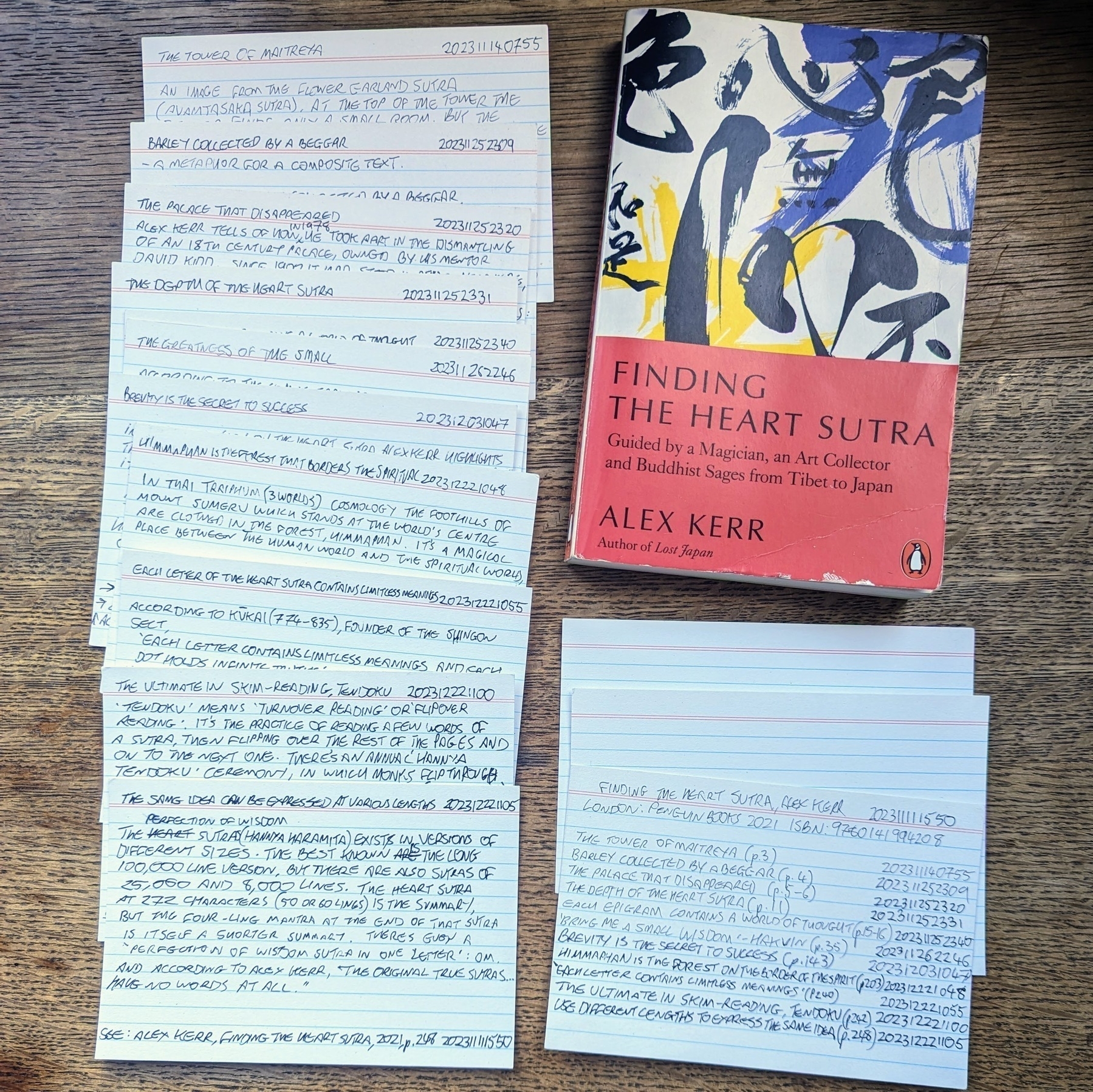Three worthwhile modes of note-making (and one not-so-worthwhile)

I finished reading Alex Kerr’s Finding the Heart Sutra on New Year’s Eve, so it just scraped into my reading for 2023. And while reading I made notes by hand, as I’ve done before. Although there aren’t very many notes (just eleven, plus a literature note that acts as a mini-index), they’re high quality, since I found the book very interesting.
I don’t mean I’ve written objectively ‘good’ notes. Rather, I mean the notes are high quality for my purposes. Everyone who reads with a pen in hand is an active reader, so the notes one person makes will be different - perhaps completely different- from the notes another person makes. In any case, no two readers read a book the same way.
Reflecting on this it seems to me there are at least three fruitful ways, or modes, of making notes while reading, as follows: Free-form, directed, and purposeful note-making.
- Free-form note-making. In this mode, you start with no expectations and just make notes whenever something grabs you. This is great when you don’t yet know what you want to focus on. The risk is you try to read everything, only to discover it’s like drinking the ocean. Ars longa, vita brevis, so you’ll ultimately need to narrow down your field somehow.
- Directed note-making. In this mode, you already know, broadly, what interests you, for example, Richard Hamming’s 10-20 problems. So you make notes whenever something you read resonates with one of your predetermined interests. I used to think I was interested in everything, like Thomas Edison. But after writing notes on whatever took my fancy for a while, I observed that really, I kept revolving around a fairly limited set of concerns. So mostly these days I make directed notes, or else engage in the closely related purposeful note-making.
- Purposeful note-making. This mode is more focused still than directed note-making. Here you have a specific project in mind, such as a particular book or article you want to write, and so you make notes whenever your reading material chimes with what you want to write about. If there’s a risk to this kind of note-making, it’s that in your focused state, you’ll miss ideas that you might otherwise have found worth making notes about.
Each of these note-making modes has its place, but in this particular case I was reading Finding the Heart Sutra with a very specific project in mind. So the notes I made were also quite specific. I imagine that someone else would be surprised by the notes I made, since they don’t really reflect the contents of the book. For instance, my notes are definitely not a summary of the book’s contents. Nor do they even follow the main contours of the book’s themes. Instead, I was making connections while reading with the main concerns of my own project. Each of my notes stands in its own right and could potentially be used in a variety of different contexts, but collectively, they make sense in relation to my own preoccupations. They fit into my own Zettelkasten, and no one else’s.
“Most great people also have 10 to 20 problems they regard as basic and of great importance, and which they currently do not know how to solve. They keep them in their mind, hoping to get a clue as to how to solve them. When a clue does appear they generally drop other things and get to work immediately on the important problem. Therefore they tend to come in first, and the others who come in later are soon forgotten. I must warn you, however, that the importance of the result is not the measure of the importance of the problem. The three problems in physics—anti-gravity, teleportation, and time travel—are seldom worked on because we have so few clues as to how to start. A problem is important partly because there is a possible attack on it and not just because of its inherent importance.”
If you want to know more about how to read a book, you could do worse than read How to Read a Book, by Mortimer Adler. It’s not the last word on the subject, but it’s a good starting point.
And it’s a warning against a fourth mode of note-making that I don’t advise: encyclopedic note-making. This is where you read a book and try to write a summary that will work for everyone. First, it’s hard work, and secondly, it’s probably already been done. If you open the link above you’ll see that the Wikipedia entry for How to Read a Book already includes a summary of the book’s contents. There are circumstances where the careful and complete summary is worthwhile, but I suggest you only start this task with the end - your own end - in mind.
If you have thoughts about making notes while reading, I’d be very interested to hear about it.
See also:
A note on the craft of note-writing
Learning to make notes like Leonardo
How to make the most of surprising yourself
How to be interested in everythingAnd to keep up to date, subscribe to the weekly(ish) email:
—